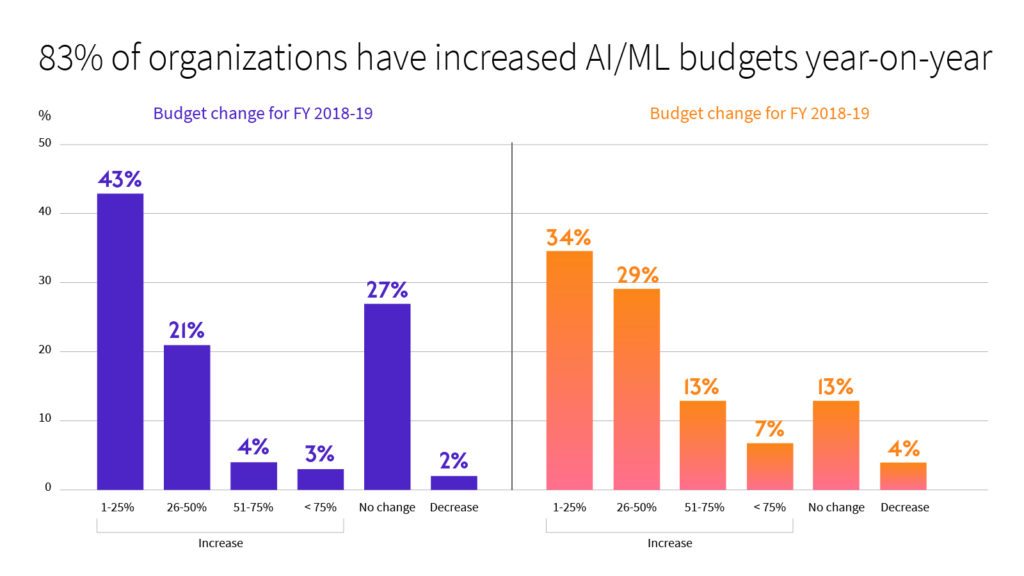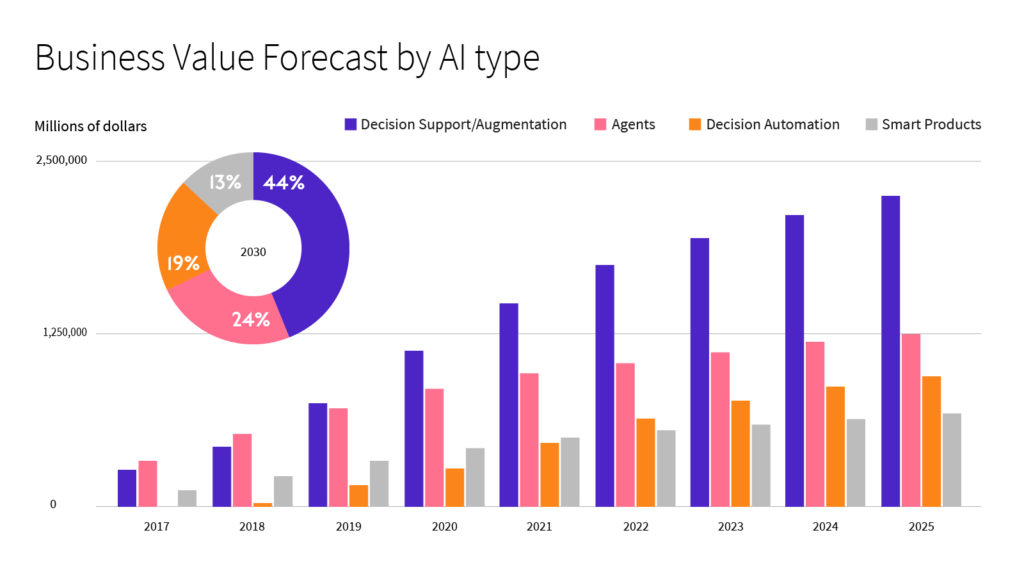A Guide to AI in Enterprise: The What, The Why, The Who
Enterprise AI is guiding business into a new digital age of automation, efficiency, and data-driven business decisions.
Digital transformation remains at the top of the priority list and continues at a rapid pace for companies of all sizes, and across industries. Even organizations in industries that are notoriously slow to change and heavily reliant on deeply ingrained manual processes are changing the way they do things, giving rise to one undeniable trend: a steady adoption of Enterprise AI to bring even more focus on the customer, on data, and on efficient decision making.
Market research, along with industry numbers indicate that companies understand the importance of Enterprise AI. For example, a Gartner study forecasted that AI software revenue will total $62.5 billion in 2022, up 21.3% from 2021.
Clearly, companies believe in the importance of AI and they are investing in it. More importantly, however, how should organizations be sure that they are leveraging Enterprise AI in the most effective ways?
That brings up a few other key questions: What is Enterprise AI exactly? What are some of its advantages? What are some of its inherent challenges?
Let’s take a closer look.
.
The What: Role of Enterprise AI
Enterprise AI refers to the application of artificial intelligence and machine learning in everyday business processes to automate tasks, improve data-driven decision making, and produce better insights.
Enterprise AI is applied at a company-wide scale as a foundational tool and aims to deliver insights, structured data, and business information that is easy for anyone in the business to digest and action upon. With Enterprise AI, executives, managers, and stakeholders with decision-making capability can take insights and efficiencies created by AI and add human value to improve processes, and ultimately, run their business better.
By way of example, organizational budgets showing AI investment reflect the value that Enterprise AI can bring to the table. According to Forbes, 83% of enterprises increased their budgets for AI and ML year over year from 2019 to 2020, with that number set to grow even higher by 2022.

Source: Forbes
.
The Why: How AI Can Help Enterprises
The use of Enterprise AI can help businesses in a variety of ways. Automation saves times, ML algorithms provide more detailed business insights, and both promote a data-driven environment. Here are a few specific examples:
Process automation
From paperwork to cybersecurity to maintenance, the consistency and scalability of AI allow for many low-level processes to be fully automated, saving hours of manual work. Automation of basic tasks then leaves space for humans to spend time on the more valuable work that still requires a human touch.
AI-Driven Search
Search functions that are driven by AI give a new perspective to companies looking to provide their customers with a better, more personalized experience. AI-driven search helps companies understand factors such as context or the reasoning behind searched items in addition to trends that their customers are driving. This means that instead of simply knowing what people search, they get insight into why they search for it, improving customer experience and understanding demand.
Chatbots
Chatbots are an example of process automation that was discussed above, but they are in a category of their own in how AI can help businesses. Using chatbots as a first line point of contact in customer experience and even internal HR processes provides a valuable communication tool for customers and internal stakeholders, automating a large, time-consuming part of business processes.
Data-driven decision making
According to study by Gartner, by 2030, decision support and augmentation will account for 44% of business value derived from AI, on a global scale. As companies work to make decisions based on data, AI and ML can provide those insights to create truly impressive business strategy.
Data privacy and governance
As the amount of data available to businesses increases, so do concerns of data privacy and governance. Enterprise AI solutions enhance an organizations’ management of large amounts of potentially sensitive data with its ability to sort and classify data efficiently. In response to recent (and future) privacy laws such as the European Union’s General Data Protection Regulation (GDPR), AI can be used to handle data privacy requests from individuals, which require a quick response and create a large administrative burden.

Source: Gartner (August 2019)
.
The Challenges: Barriers to widespread Enterprise AI
Looking at the benefits of Enterprise AI, it’s hard to understand why most companies haven’t already embraced it fully and completely. It’s a powerful tool, so let’s use it, right? Turns out, it’s not quite so simple. There are several main barriers to adoption, which we’ve outlined here:
Finding the right talent
Developing and launching a robust Enterprise AI strategy requires the right team. Businesses need data scientists, machine learning engineers, and other AI professionals with strong automation and digitalization skills to execute a new strategy. As a result, demand for these professionals is high, and the war for talent is on. For example, Burning Glass Technologies found, in a study based on the job market in the US, that demand for AI and ML skills is growing at a 71% compound annual growth rate through 2025.
Getting alignment across the organization
CIOs, CTOs, and technical decision makers within any organization understand the high importance of adopting AI. However, getting alignment across the organization poses a bigger issue. Many Enterprise AI projects end as individual efforts or only supported by technical departments, as effecting change across an entire organization proves difficult, and time-consuming.
Unrealistic expectations of AI capabilities
Rather than being a quick fix, or a single solution, Enterprise AI efforts must be a part of a larger strategy that incorporates various AI solutions in multiple phases. In many cases, when an AI initiative doesn’t produce immediate results, companies lose interest in pursuing Enterprise AI further.
There’s no easy solution to the above challenges, and as such, these issues loom large over effective AI adoption. However, they can be solved by getting alignment before a project, setting realistic goals and expectations for all involved, and ensuring full circle agreement in Enterprise AI implementation. Finally, organizations must use the right tools, choose competent AI business partners, and commit to a long-term investment in seeing the solution through.
The value of Enterprise AI far outweighs the challenges faced, meaning that organizations that are able to break through these barriers will be far ahead of the rest when it comes to getting the highest value out of AI and ML initiatives.
.
The Who: Enterprise AI Use Cases
The impact of Enterprise AI is most clearly seen in improved efficiency in business operations and improvements in customer experience and satisfaction. Here are several specific examples of Enterprise AI use cases in various industries.
Retail
Within the retail industry, Enterprise AI is most often applied in the form of machine learning algorithms that provide accurate forecasts for demand and aid in pricing decisions. For e-commerce retail operations, AI-driven search functions improve product recommendations and product placements, creating a hyper-personalized experience for every consumer. Another essential part of success in the retail industry is customer service, and Enterprise AI solutions such as chatbots and ASR models can be used to facilitate easy, constant communication between the customer and the organization.
Manufacturing and Supply Chain
In manufacturing, Enterprise AI solutions such as ML algorithms that enable predictive maintenance save time and maintenance costs. Demand forecasting capabilities is extremely valuable for supply chain management, allowing organizations to streamline production processes and eliminate costly supply chain delays.
Healthcare
Enterprise AI has the biggest impact on the healthcare industry with its automation capabilities. Data processing by AI reduces the administrative load of paperwork and filing, allowing organizations to redirect resources, save on operating costs and ultimately, provide better care for patients themselves.
.
Adapt and grow
Often, when we speak about Artificial Intelligence and Machine Learning in business, people’s minds jump to a workplace in which human intelligence is superseded by uncaring machines.
However, the reality is much more nuanced and much less scary: Enterprise AI, deployed in a thoughtful, practical way helps augment human intelligence, giving us the space to perform at our very best – building a future with Enterprise AI that looks very bright indeed.
Digital transformation and the adoption of AI and ML within organizations isn’t an option anymore – it’s a mandatory response to the changing business environment, and companies must adapt and adopt to remain competitive in the upcoming years.
